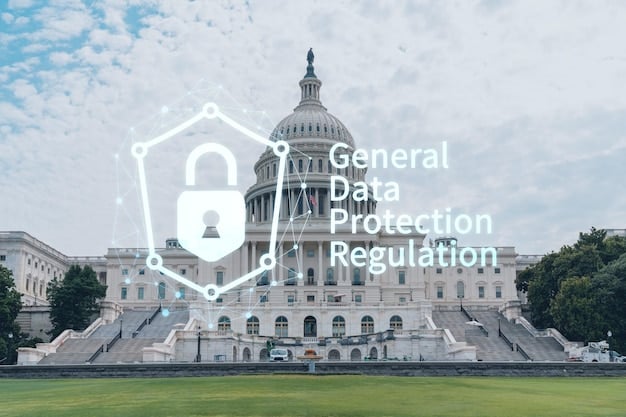Cryptocurrency Regulation: What You Need to Know

Anúncios
Cryptocurrency regulation is essential for ensuring compliance, protecting consumers, and fostering a stable market environment, while businesses must stay informed about evolving laws to succeed.
Cryptocurrency regulation has become a hot topic as digital currencies continue to gain popularity. Have you wondered how these regulations affect your investments and the wider market dynamics? Let’s dive in!
Understanding cryptocurrency regulation
Understanding cryptocurrency regulation is essential in today’s digital economy. Governments worldwide are developing frameworks to manage and oversee cryptocurrency transactions.
Regulations help ensure that cryptocurrencies are used responsibly and can protect consumers from fraud.
Why Regulation Matters
With the rise of cryptocurrencies, the need for regulation has become increasingly important.
Anúncios
- It enhances consumer protection by reducing the risk of scams.
- It helps in preventing illegal activities such as money laundering.
- Regulations can encourage mainstream adoption by providing a clearer legal framework.
Many regions, like the European Union, are actively implementing regulations that guide cryptocurrency operations. For more details, you can check the European Commission’s website.
Key challenges in cryptocurrency regulation
One of the main issues in cryptocurrency regulation is balancing innovation while ensuring safety. Regulators want to protect consumers without stifling technological growth.
Another challenge is the rapid evolution of technology in the crypto space. New cryptocurrencies and blockchain solutions appear frequently, making it difficult for laws to keep pace.
Common Challenges Faced
- Establishing clear regulations that can be easily understood and implemented.
- Addressing privacy concerns related to user information and transaction data.
- Preventing fraud and illegal activities without limiting legitimate businesses.
Many governments are still grappling with these issues, striving to create a regulatory landscape that can adapt. For a more comprehensive look at these challenges, consider reviewing the IMF’s insights on cryptocurrency regulation.
Impact of regulations on cryptocurrency markets

The impact of regulations on cryptocurrency markets is significant. Regulations can affect market stability, investor confidence, and the overall environment for digital currencies.
When clear regulations are established, they can create a sense of security for investors. This leads to increased participation in the market. Conversely, overly strict regulations can hinder innovation.
Effects of Regulation
- Regulation helps to reduce fraud and improve consumer protection.
- It can attract institutional investors, bringing more capital into the market.
- On the other hand, it may lead to market volatility if rules are frequently changing.
Countries with defined regulations often see healthier markets. For more insights on this topic, you can refer to the U.S. Securities and Exchange Commission, which offers valuable resources on cryptocurrency regulations.
Future trends in cryptocurrency regulation
The future trends in cryptocurrency regulation are evolving quickly as technology and market dynamics change. Regulators are adapting to new challenges to ensure consumer safety and market integrity.
One trend is the shift towards global regulation. Countries are working together to create comprehensive frameworks that can effectively oversee the international nature of cryptocurrencies.
Emerging Regulatory Trends
- Increased focus on DeFi (Decentralized Finance) and how it impacts traditional financial systems.
- Development of clearer rules for stablecoins and their usage in everyday transactions.
- Advancements in regulatory technology (RegTech) to streamline compliance and monitoring.
For more insights on what lies ahead in cryptocurrency regulation, you can explore the reports available from the Financial Stability Board, which provides updates on global financial policies.
How to stay compliant with cryptocurrency regulations
Staying compliant with cryptocurrency regulations is crucial for businesses in this evolving market. In order to operate legally, companies must understand and adhere to regulatory frameworks.
One effective way to ensure compliance is by implementing robust Know Your Customer (KYC) procedures. These help verify the identities of clients and reduce instances of fraud.
Steps to Maintain Compliance
- Regularly update your knowledge on local and international regulations affecting cryptocurrencies.
- Adopt software solutions designed to monitor transactions and ensure they align with compliance requirements.
- Engage legal experts who specialize in cryptocurrency regulations to guide your operations.
Additionally, businesses should maintain detailed records and be ready for audits. The Financial Crimes Enforcement Network offers guidelines for compliance that are beneficial for cryptocurrency operators.
FAQ – Frequently Asked Questions about Cryptocurrency Regulation
Why is compliance important for cryptocurrency businesses?
Compliance ensures that businesses operate within legal boundaries, protecting them from penalties and enhancing consumer trust.
What are the key regulations I should be aware of in the cryptocurrency space?
Key regulations usually include Know Your Customer (KYC) laws, Anti-Money Laundering (AML) requirements, and data protection laws.
How can I stay updated on changes in cryptocurrency regulations?
Regularly check reputable financial news sources, subscribe to industry newsletters, and follow updates from regulatory bodies like the SEC.
What are the consequences of failing to comply with regulations?
Non-compliance can lead to hefty fines, legal issues, and a loss of reputation, potentially resulting in decreased customer trust and business opportunities.





